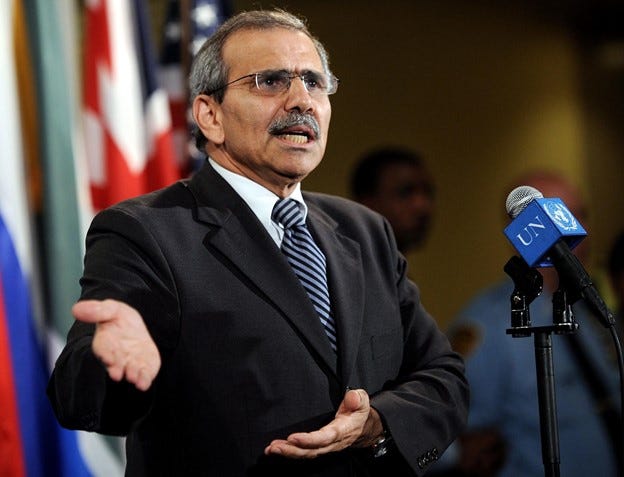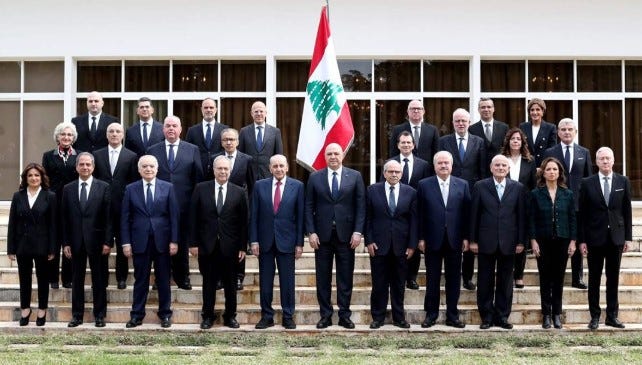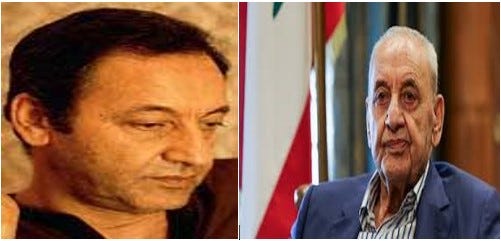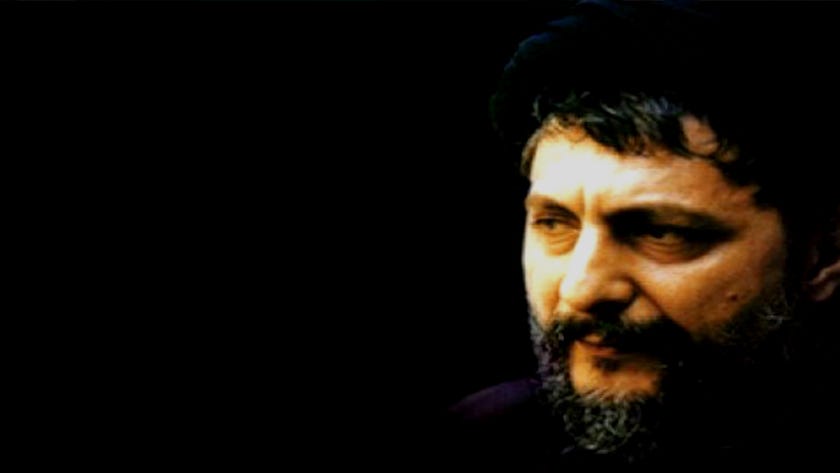The photo is self-explanatory. Nawaf Salam as if ushering in his tenure.
What in Lebanon went weak enough to give prime minister-designate Nawaf Salam the strength to form a cabinet whose profile, for the first time in decades, is somewhat resistant to the ruling class’s dictums?
It seems like an easy question, but the answer to it isn’t. Elite strangleholds on systems tend to loosen in times of meltdowns. They didn’t seem to here, though, even as sweeping collapse in 2019 wrapped up decades of hideous sectarianisms, massive abuse of power, and theft of the nation’s resources.
The way the country’s oligarchy went about running a catatonic state as if it was alive and functioning was always a rather bizarre sight. The spectacle of sparring factions coming together to defend this same state was very telling, of course. So was their refusal to countenance even the most urgent social and economic reforms to stem the crash’s worst effects.
Which almost made comprehensible Hezbollah’s decision to opt for war in the south, as if it was, indeed, another country. As if the absence of the state, which the party had played a major role in absenting, made rational, even normal, such audacious autonomy. As if the resistance’s call had no bearing on those living north of the Litani River because ours was another realm––other realms. And didn’t we in these dominions act as if we were citizens of another “republic”? As the southerners bled, the rest of us went about the routines of our day, instructed to do so by none other than Hassan Nassrallah himself.
It's not that Lebanon at large didn’t feel the small war’s fallouts. Even as we pretended to live our life unperturbed, we knew that everything about our existence was insanely wrong, not sustainable, not reasonable, like Lebanon itself. It took the big war to make the country’s fractured selves suffer terribly as one. Suddenly, the state’s severe debilitations began to matter as the reigning clique confronted its dim prospects. Shorn of funds, shorn of external cover, shorn of insulation, in the presence of homes destroyed, hundreds of thousands of lives upended, a shattered body politic, a pulverized economy, and a much weakened Hezbollah on whom it could no longer rely to hold up the regime, this clique had little choice but to concede this round to the prime minister-designate.
But the fact that Salam had to negotiate and negotiate hard with the sectarian order, in whose orbit swim Lebanon’s networks of business elites and a whole coterie of bootlickers, thugs, and hacks, shows that it still can put up a fight. Now they will lurk, bide their time, set their traps, mobilize their people in the bureaucracy and media, attempt to derail reforms, and pounce. In fact, the campaigns have already begun.
How did we get here? It took nothing short of a perfect storm to force through an opening large enough for President Joseph Aoun and Salam to slip through: a catastrophic war, harsh regional headwinds, empty coffers, lack of foreign financial support, and defections within the reigning circle. It’s a measure of the resilience and obduracy of this circle that it took such a remarkable convergence of factors to force it to compromise.
But the story that is very specifically Lebanese is an historical constant. Every sect, well before the formation of the modern state and well after, won its seat at the table through violence; and every sect which grew too dominant was ultimately cut down to a size that jives better with the delicate sectarian patchwork of the country. That is the chronicle of the Maronites with the Druze in Mount Lebanon, the Sunni-Druze coalition with the Maronites in post-independence Lebanon, and the Shiites in post-civil war Lebanon.
During this month’s intense negotiations to form the cabinet, most analysts fixated on the Shiite bloc of Hezbollah and the Amal Party. Unfair but understandable! For the better part of the last 25 years, politics swung to the duo’s beat. But like practically all political partnerships in Lebanon, it is more the spoils of power than symbiosis that had long held theirs together. The rewards have indeed been huge. Between Speaker of the House Nabih Berri’s 30-year command of parliament, Hezbollah’s military prowess and unrivaled sway over its communities, and the two parties’ decades-long stuffing of the bureaucracy with followers, theirs was a form of truly grating state capture. In a sectarian setup like Lebanon’s, they couldn’t possibly monopolize politics, so they satisfied themselves with a firm chokehold on it.
Now Amal and Hezbollah are experiencing what their sister sects experienced before them: downsizing. A mere look at the five Shiite ministers’ names tells us that, although four were named by the two parties, none belongs to their ranks. No, not even the maligned Yassine Jaber, minister of finance, who is as much America’s pick as he is Berri’s.
That is a palpable climbdown by the duo, especially Hezbollah, which, it would appear, has decided to retrench as it manages internal fissures and reassesses its role and identity. Berri, well into his 80s, presides over a movement that is professionally and reputationally impoverished. This parliamentary season is his last. He is in eclipse and so is potentially his shambles of a party.
Such is the Shiite moment, more fluid now than it has been for a very long time. Of all the trends competing for attention in the Lebanese arena, it is by far the one to watch.
Of course, it is not lost on some of us that although Amal and Hezbollah didn’t rise in tandem, they retreat together. They ascended each for reasons specific to their founders and parh. In Amal, a rising, upwardly mobile, ambitious Shiite generation found an answer, in the 1970s, that neither the doddering feudal class nor the sputtering leftist ideologies could provide. On war-torn landscapes and in an Israeli-occupied south, Hezbollah offered social backbone, staunch resistance, and a rallying cry.
Poignantly, they wane now largely because, for a good majority of their constituencies, Amal is hardly aspirational and Hezbollah is hardly revolutionary. Nor are the times, frankly. The sect’s tremendous sacrifices in this latest war wiped out its confidence and standing. It has also shaken the resistance’s core, adding pressures on it to focus on Hezbollah’s people deep grief and suffering.
The new cabinet has a little more than a year of life and a herculean task in a local and regional expanse of hazards and an ever present Israeli menace. Very capable ministers will be heading most of the key ministries. Incorruptibility and expertise unite them; a correct and judicious prime minister leads them. There is therefore a decent chance they will be able to make strides on the most urgent files.
It's not much, but it’s not nothing.
On Another Note
Because, by all appearances, we are in an age of unfathomable cruelty and madness, I thought Mahmoud Darwish’s poem, Think of Others, lends itself to this sorriest of eras.
As you prepare your breakfast, think of others
(do not forget the pigeon’s food).
As you conduct your wars, think of others
(do not forget those who seek peace).
As you pay your water bill, think of others
(those who are nursed by clouds).
As you return home, to your home, think of others
(do not forget the people of the camps).
As you sleep and count the stars, think of others
(those who have nowhere to sleep).
As you liberate yourself in metaphor, think of others
(those who have lost the right to speak).
As you think of others far away, think of yourself
(say: “If only I were a candle in the dark”).








A masterful depiction of the political landscape, rendered in scientific rhetoric, but as always infused with a distinct style. The Darwish’s finale is just the perfect ending. Thank you.
Lebanon’s recent political landscape, masterfully and eloquently painted. Hats off!